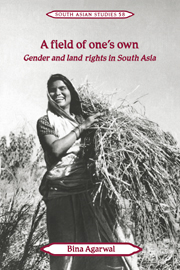
-
Select format
-
- Publisher:
- Cambridge University Press
- Publication date:
- January 2010
- February 1995
- ISBN:
- 9780511522000
- 9780521429269
- Dimensions:
- Weight & Pages:
- Dimensions:
- (228 x 152 mm)
- Weight & Pages:
- 0.831kg, 596 Pages
- Series:
- Cambridge South Asian Studies (58)
You may already have access via personal or institutional login- Series:
- Cambridge South Asian Studies (58)
Book description
This is the first major study of gender and property in South Asia. In a pioneering and comprehensive analysis Bina Agarwal argues that the single most important economic factor affecting women's situation is the gender gap in command over property. In rural South Asia, the most significant form of property is arable land, a critical determinant of economic well-being, social status, and empowerment. But few women own land; fewer control it. Drawing on a vast range of interdisciplinary sources and her own field research, and tracing regional variations across five countries, the author investigates the complex barriers to women's land ownership and control, and how they might be overcome. The book makes significant and original contributions to theory and policy concerning land reforms, 'bargaining' and gender relations, women's status, and the nature of resistance.
Awards
Winner of the A. K. Coomaraswamy Book Prize 1996 (Association for Asian Studies, USA)Winner of the Edgar Graham Book Prize 1996 (Dept. of Dev. Studies, SOAS, University of London)Winner of the K. H. Batheja Award 1995–96 (Batheja Trust, Bombay University).
Reviews
‘This book makes a major contribution in the field of land rights thereby opening up once again the debate on land reforms in a unique and distinct manner. If the book scores because of the novelty of its arguments, the interdisciplinary focus and its innovative perspective, it is because is has incorporated over twenty years of research and scholarship in gender studies.’
Source: The Hindu
Contents
Metrics
Altmetric attention score
Full text views
Full text views help Loading metrics...
Loading metrics...
* Views captured on Cambridge Core between #date#. This data will be updated every 24 hours.
Usage data cannot currently be displayed.
Accessibility standard: Unknown
Why this information is here
This section outlines the accessibility features of this content - including support for screen readers, full keyboard navigation and high-contrast display options. This may not be relevant for you.
Accessibility Information
Accessibility compliance for the PDF of this book is currently unknown and may be updated in the future.


